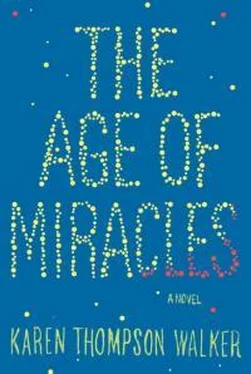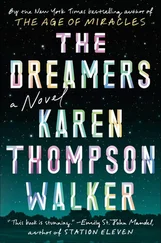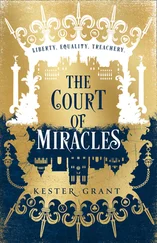“It does?” I said. “Maybe my dad should look at it.”
“It’s not a big deal,” he said.
After a few minutes, the bleeding stopped. I noticed nothing else. He hid his symptoms well.
Sylvia’s house remained empty. A for-sale sign stood in the yard, though the roof remained partially collapsed and draped in plastic. No buyers ever came to see it. Once, in our wandering, Seth and I peeked through a window. The wooden floor was slightly darker where the piano had once stood, and the wind chime made of seashells trilled lightly in the breeze. These were the only traces that Sylvia had ever lived there.
I sometimes wondered where she had gone. One of the networks aired a television special that year about the real-time colonies and their residents, and I searched it scene by scene for a glimpse of Sylvia in one of its shots, but I never spotted her.
In Circadia that same summer, three people died of heatstroke in one day, after forty-one hours of sunlight drove the thermometers to 135 degrees in the desert. The colonies would almost all close eventually. As the days grew longer, it proved less and less possible for the human body to adjust. The promise of slow time went largely unfulfilled. For real-timers, the consequences of long periods without sleep began to interfere with certain cognitive functions. Some gave up and joined the rest of us on the clock. Many of those who persisted in the colonies faded into madness. A group in Idaho was found close to starvation, delirious and hallucinating—the whole group had stopped eating, though their cupboards were full of canned food.
That was also the summer of food shortages and suicide cults. It seemed that every day a new group of people was found dead, poison floating in their bloodstreams.
Fresh produce was harder and harder to find. In July the government launched the Life Garden campaign to encourage individuals to grow their own food in covered greenhouses. Instructional kits were distributed, as well as packets of the hardiest seeds. We tried to grow carrots, but they came out sickly and small. What little light they got came from artificial lights. Mushrooms were the only abundance.
We swallowed mouthfuls of vitamins to make up for the lack. But soon the vitamins began to run low. My mother’s collection of canned food grew rapidly that summer. The stockpile took over the dining room.
Seth and I spent a lot of time imagining what the world would look like after the humans were gone. We heard that everything plastic would outlast the rest, and so we pictured the houses on my street reduced to piles of PVC pipes and LEGOS, tupperware and beach pails, computer chips and cell phones and razors. Bottles of every variety would tower over everything else, the labels fading across the decades and the plastic cracking under the force of a harsh and lifeless sun.
“Think of all the toothbrushes,” said Seth.
Once we admired a mosquito landing on a porch light. “Look,” said Seth. His eyes were large and watery. The mosquito fluttered away. It struck us, as it flew, as a delicate, elegant thing. “Look! Look!” We were convinced for one moment that this was the last wild creature on earth.
We wandered the canyons with flashlights. We peeked beneath our curtains at the sun. We lay flat on our backs in the darkness and watched the auroras the way other kids had once watched clouds.
At night sometimes we’d kiss for a while in my driveway. I still remember the way his lips felt on mine, the sugary taste of his gum.
Sometimes it seemed that our memories were failing us. I found I could no longer recall clearly the contours of my grandfather’s face or how my mother looked before she got sick—I was sure that her skin had faded some, turned rougher, but it was hard to say for sure. The sound of Sylvia’s piano completely vanished from my head. Similarly went the sensation of sunshine on my face, the taste of strawberries, the squish of a grape in my mouth. It got harder and harder to recall those ancient mornings when the sun rose like clockwork, the slowly lifting layers of fog, the lovely light, the start of day.
But sometimes a bit of wind or a certain smell might remind me of the way it used to be. The horizon might seem stark again, and I’d wonder for just a moment what had happened to the trees. A sudden sense of silence sometimes rushed into my ears, and I’d remember what we had lost: the songs of all the birds.
On other continents, famine spread. We tried to remember that we were luckier here than most.
In August of that year, the power company dug up our street. It had something to do with the earthquakes, some related repair. Workmen in orange vests jackhammered a stretch of sidewalk to reach the cables that snaked beneath the street. A few hours later, when the work was finished, they poured two new squares of cement in the sidewalk to replace the ones they’d destroyed. The cement was still wet when the workmen drove away; it was guarded only by two orange cones and one strip of yellow caution tape.
Seth and I knelt beside it, eager to leave our mark but unsure what to write. I was aware of his body next to mine as we crouched beneath the streetlights and conferred.
“Whatever we write is going to last a long time,” he said. He stared hard at the cement and chewed his lip—this was one of his habits. I knew all his habits by then. He looked up at me. “Maybe our whole lives.”
I felt a vague sadness then, the premonition of a future feeling.
The surface of the wet cement was as smooth as new snow, and it smelled like sea salt. We spent a long time deciding what to write, thinking only slightly faster than the speed at which wet cement dries in open air.
And still the earth turned, and the days passed, and the constellations wound across the sky. Gradually, we learned to sleep away the white nights in the radiation shelters we’d all dug beneath our yards, where the air smelled like dirt and like stone, so you never forgot you were under the ground.
Little by little—and then all at once—that summer slipped away.
What happened after that has been well recorded elsewhere. But I doubt that Seth’s name has appeared in any account but mine.
He couldn’t hide it forever. We were walking home from the beach one afternoon, headlights flashing past us. It was early in a stretch of darkness, and the moon was shining low in the sky, just visible above the rooftops of the neighborhood.
We were sharing a bag of sour candy as we walked. Seth was looking at the stars.
“If humans really could go to Mars,” he said, “would you want to go?”
I loved the way he thought about these things.
“I don’t think so,” I said. “I’d be too afraid.”
“I’d go,” he said. “I’d love to do something like that.”
It was only a few seconds later that I heard the sound of the bag drop from Seth’s hand. I remember the slight smack of the plastic hitting the sidewalk as the candy spilled into the street.
As I turned toward him, I felt his body lean hard into my shoulder. The he jerked headfirst to the sidewalk.
I think I knew then that nothing would be the same after that.
I shouted his name. I looked at his eyes: they were half open and blank. His head was rolling forward and back. His whole body was shaking on the pavement.
I ran what felt a long distance from the sidewalk to the front door of the nearest house, at a pace that reminds me now of a dream I sometimes had at that age and do still, where the ground falls away wherever I step. Soon I was knocking on a stranger’s door with two fists. Soon I was screaming at the woman who lived there. Then she was calling an ambulance, her voice as panicked as mine.
“Oh my God,” she shouted into the phone. “There’s a boy having a seizure in the street.”
Читать дальше












